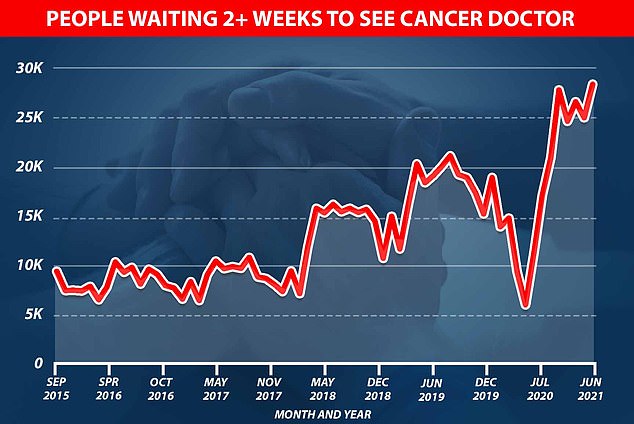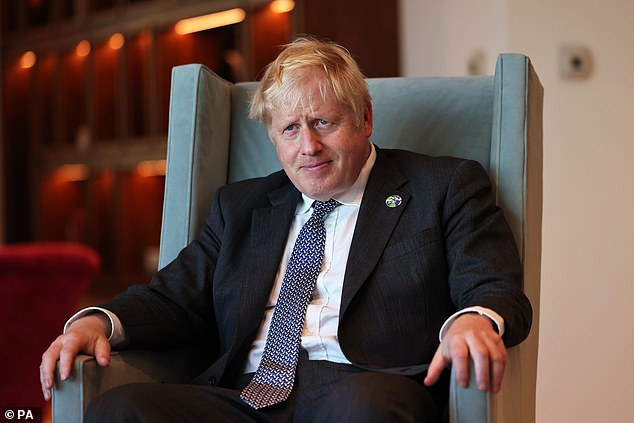An extra 10,000 people are likely to die of cancer because of the Covid pandemic, a study has suggested.
University College London researchers said a drop in emergency referrals from GPs last year across the UK resulted in around 40,000 late diagnoses of the disease.
These delays and longer waits for NHS treatment — fuelled by the pandemic — mean thousands will die ‘significantly earlier’ from the disease than would have been the case pre-pandemic.
The study of more than 2,000 adults found nearly two thirds of people worried about bothering family doctors with ‘minor health problems’ because of Covid.
And during the first lockdown last year, the NHS moved GP appointments to online and telephone to limit face-to-face consultations. No10’s ‘stay at home, protect the NHS, save lives’ messaging put people off coming forward, meaning their symptoms were never investigated.
It comes after Boris Johnson yesterday piled pressure on GPs to offer more face-to-face consultations amid concerns too many patients are struggling to see a doctor in-person.
Just 57 per cent of GP appointments are now in person compared with 80 per cent before the pandemic.
A senior coroner in Manchester earlier this month concluded a lack of face-to-face care contributed to at least five deaths in the area during the pandemic.
Downing Street said last night: ‘The public rightly may choose to want to see their GP face to face — and GP practices should be making that facility available to their patients.’
Charities and politicians are urging the Prime Minister to act amid fears that cancers and other serious health conditions are being missed in remote consultations.

Graph shows: The number of people waiting to see a cancer doctor in the UK jumped from just over 5,000 at the start of the pandemic to nearly 30,000 in June this year
Twenty-three million appointments, whether face-to-face or otherwise, were also ‘lost’ during the pandemic.
Out of the 2,000 people polled by UCL, those above 65 — the group who require the most healthcare — were the least likely to want to see their doctor remotely.
British adults want blood tests which screen for cancer, study finds
A new survey has found that three in four British adults want blood tests for cancer screening amid a rise in concerns around the disease.
The report released by University College London (UCL) states that 40 per cent of respondents said their lives had been changed because people important to them were harmed by cancer.
The survey, undertaken in May 2021 of 2,096 UK adults, found that 75 per cent said when single blood tests for multiple forms of cancer become available, they will want to be regularly tested.
The 25 per cent that were unsure about accepting cancer testing were also vaccine hesitant, and tended to be relatively young and ethnic minorities.
Report co-author Professor David Taylor, UCL School of Pharmacy, said: ‘Since early 2020 most people have been primarily focused on the threat of Covid, but as the pandemic becomes better controlled by vaccines, medicines and other public health measures, cancer is re-emerging as the UK public’s top health priority.
‘The immediate challenge is to reduce NHS waiting lists, yet to retain British public confidence up to the next general election, policy makers will also need to restore progress in cancer research, prevention and medical and social care improvement, despite the economic impacts of Brexit and Covid.’
Advertisement
Some 56 per cent in that age group opposed having more telephone and online consultations, while 24 per cent were in favour of them.
And only 46 per cent of people aged 18 to 24 wanted more remote appointments, with more than a quarter (28 per cent) against them.
Professor David Taylor, a pharmaceutical scientist at UCL and co-author the report, said the trend of increasing online consultations has resulted in delays to diagnoses.
He told The Daily Telegraph: ‘The immediate effect of the pandemic was to delay early diagnosis.
‘Even before the pandemic, Britain’s performance was not up there with the best of the world.
‘There is some evidence to suggest every month treatment is delayed can increase the risk of early death by seven percent.
‘Some of it is about patients not presenting, worrying about being a burden on their GP, some of it is about access problems.’
When asked about the NHS, respondents were generally positive as over one third said if they or members of their family develop cancer, the NHS care available would be world-class, and 40 per cent agreed NHS care would be as good as anywhere else.
Only five per cent of the total participants felt their NHS cancer treatment would be poor.
The survey was done by the research consultancy Yonder on behalf of UCL academics.
Co-author and cancer clinician Professor Mark Emberton said: ‘I strongly support the efforts being made to re-awaken public awareness of the value of early cancer diagnosis and to encourage people to report unusual symptoms to their doctors, even if they seem minor.
‘But there is only so much this can achieve without more investment in better diagnostic services and optimal access to effective new treatments for all stages of cancer.
‘Our research should remind politicians that the UK public wants the NHS to be a global leader in cancer care.’
Doctors say telephone and video appointments allow them to get through more patients.

Boris Johnson (pictured at a meeting with Amazon Executive chairman Jeff Bezos in New York yesterday) piled pressure on GPs to offer more in-person consultations on Sunday night
But critics believe the pendulum has swung too far and that doctors are more likely to miss the signs of a more serious illness if they don’t see someone in the flesh.
Boris Johnson’s spokesman said: ‘The NHS has been clear to every GP practice that they must provide face-to-face appointments, and we fully support that.
‘GPs throughout the pandemic have worked hard to see patients and appointment numbers have returned to pre-pandemic levels.
‘It’s right that the public expect to be able to see their GP in person, if needed.’
There have been calls to change the way GP practices are funded to incentivise doctors to see patients face to face.
The pressure group Silver Voices is campaigning for a statutory duty to be placed on them to hold in-person surgeries if patients want them.
Caroline Abrahams of the charity Age UK said older people were struggling with telephone triage.
Source link : https://www.dailymail.co.uk/news/article-10012093/An-extra-10-000-Britons-likely-die-cancer-Covid-pandemic.html











